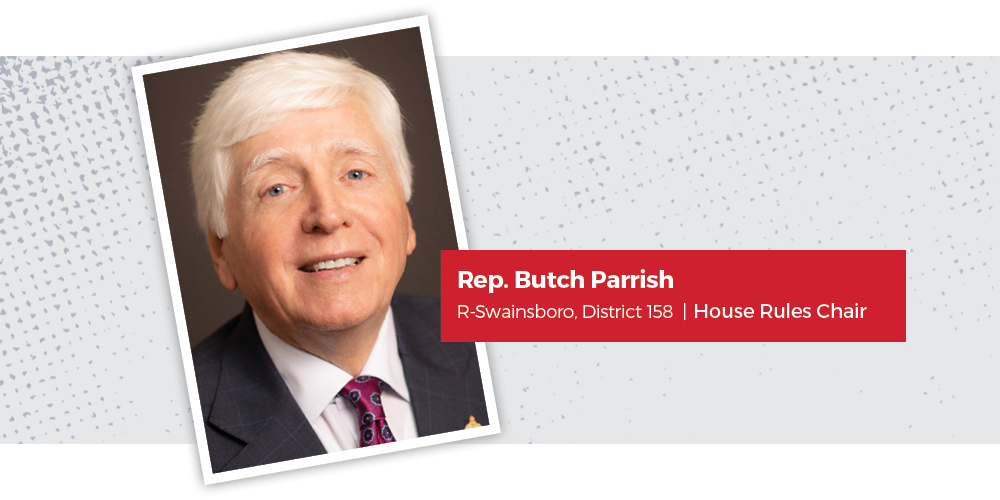GA Legislative Watch 2024 | Week Six
Powered by OHIO RIVER SOUTH
GA Legislative Watch
By Molly Mcloughlin & Rebecca Wallace ● Feb 17, 2024
Smart Brevity™ count: 5 mins…1,315 words
🙅♂We’re half way through the session and that time when committee chairs start cutting off testimony has begun.
- Legislative days 23-25 will be Tuesday through Thursday. See the full schedule here.
One fun thing: Our legislators must be hungry since more state food designations are being cooked up — this time, naming collards the official state greens and “potlikka” the official sauce in which to dip the previously passed official state bread, cornbread.
OK, now we’re hungry. 🍽
1. One big thing: Housing supply and demand

🏘 Home is where the heart is. And everyone — from every day residents to economic developers and local governments — agrees it’s past time to put our heart in the housing crisis.
- Amidst many ideas, Sen. Frank Ginn’s (R-Danielsville) plan could have the most broad impact.
He says the goal of his Infrastructure and Community Development Act, SB 435, which was heard in a Regulated Industries subcommittee for the first time, is “to bring down the cost of housing.”
- It creates Community Development Districts (CDDs) to finance public infrastructure and improve how local governments carry out, maintain, and pay for new developments.
- Voters must approve it with a constitutional amendment, SR 533, because it deals with local tax debt.
Why it matters: Not only will CDDs address the housing and public infrastructure demand spurred by major economic development projects across the state, it also ensures residents won’t face tax increases when new housing comes online.
- What CDDs are not intended to be are zoning or planning authorities with the ability to adopt building and land codes.
- They’ll be created and bound by local governments and their individual governing boards will be elected by CDD landowners.
- The target will be large developments of single family homes that could bring commercial and mixed-use development with them.
- Consider “The Villages” in Florida, which utilizes a similar financing model deployed across the state.
The bottom line: Sen. Ginn’s plan removes the debt liability from cities and counties and keeps it with the CDDs’ properties.
- Backers believe this model will make for better financing rates, more reliable funding for property and infrastructure maintenance, and more housing with stable, long-term property values.
2. Notable legislation

Limiting accident lawsuits. By a 46-2 vote, SB 426 🧐 came hauling out of the Senate to lower insurance rates for truckers by limiting the ability for accident victims to sue the truckers’ insurance companies.
- With this measure, insurance companies are only liable if the trucking company involved in an accident has gone bankrupt, or if the company or driver can’t be found to serve the lawsuit.
- What they’re saying: High legal exposure makes insurance rates go up, and in effect, hikes up costs to do business.
📹 We’ll be watching. The highly anticipated House measure aimed at restraining the state’s film tax credit, HB 1180, had its first committee hearing with a packed room of lobbyists hoping to keep the incentives intact.
- Get out the popcorn: This is the first of many hearings.
The bill to strike data center equipment tax credits, HB 1192, also had its first hearing.
- Opponents of the bill say their communities have significantly benefited from data centers locating to their cities, while others say the centers use too much electricity and haven’t lived up to ROI predictions.
The “Safe at Home Act,” HB 404, which would ensure safe living conditions in rental properties, passed unanimously out of the Senate Judiciary committee.
- What they’re saying: Housing advocates acknowledge this would be a big step forward, but remain concerned that the bill lacks a definition for “habitability.”
Lowering the low-income housing tax credit. HB 1182 was heard in the Ways and Means Committee and would limit the state credit to 80% of the federal credit, currently matched dollar-for-dollar.
- Only “targeted community projects,” which include rural housing, senior and veteran housing, and housing with access to high-frequency transportation, would be eligible to receive 100% of the federal credit.
- Yes, but: Some are asking if this is the right time to roll back a program that lowers housing costs during a glaring housing shortage.
🏠 Capping property taxes. The Senate passed a bill to cap increases on unimproved home assessments each year to 3%.
- What’s next: While SB 349 goes to the House, the Senate will hear HB 1019 which passed last week to lower property taxes by doubling the state’s homestead exemption to $4K.
- Big picture: Though local governments and school districts may have to raise millage rates to make up for the cap, proponents say this is more transparent than abstract home evaluations.
The HBCU innovation districts bill, sponsored by Sen. Sonya Halpern (D-Atlanta), passed out of committee with bipartisan support.
- Zoom out: Lt. Gov. Jones joined Sen. Halpern last year to tour HBCUs and learn about their needs.
- “Prosperity planning districts” around Georgia’s ten public and private HBCUs are intended to spur quality economic development, attract more businesses, and ultimately, improve campus life and enrollment.
Cash accepted. Rep. Todd Jones’ (R-South Forsyth) HB 940 would require physical storefront retailers to accept cash payment no matter what goods or services they sell and is expected to be voted on in the House next week.
- This brought up “swipe fees” – the charges incurred by retailers from credit card companies typically passed on to the consumer – and now they might be studied with the introduction of HR 1135.
3. Leadership changes

Rep. Butch Parrish (R-Swainsboro) has been named House Rules Chairman replacing the late Richard Smith.
- Rep. Parrish has served as a state lawmaker for 40 years, just short of former Rep. Calvin Smyre’s nearly 50 years – the longest term under the Gold Dome.
4. Other political news

“We’re not full,” said the Atlanta Regional Commission’s research director in discussing its recently released report:
- The 21-county Atlanta region will grow to 7.9 million older and more diverse people and will add 856K jobs by 2050.
- Gwinnett County alone will grow by 1.2 million people by 2050 and the fastest growing Forsyth County will increase its population by 79%.
- Go deeper.
💰 Not what it seems. State tax revenues were up 2.1% in January over last year, but the government was still collecting fuel taxes.
- Individual and sales tax collections – which provide more than half of all state revenue – were essentially the same. Go deeper.
The Gold Dome is not the place, suggested Speaker Jon Burns when asked what he thinks about the state Senate panel investigating DA Fani Willis’ misconduct allegations.
- This, while the hearing to determine whether the allegations disqualify her from prosecuting the election interference case proceeds down the street in Fulton County Judge Scott McAfee’s court room.
A special runoff and a special win. An open state House seat in Augusta has former Columbia County Commissioner Gary Richardson in a runoff against a conservative, 21-year-old social media influencer, C. J. Pearson.
- They’re vying to succeed Rep. Barry Fleming, who resigned to accept a judicial appointment from Kemp.
- Former state Rep. Tim Bearden (R-Carrollton) won the special election for the Senate seat to replace Mike Dugan who resigned to run for U.S. Rep. Drew Ferguson’s seat.
The State Election Board said no to recommending the legislature ban no-excuse absentee voting in a tie broken by the new Gov. Kemp appointee and Chair John Fervier.
5. What’s next

Crossover day is upon us. In just two weeks, bills must pass out of their chamber of origin to continue their legislative journey to becoming a law.
🎆 Monday is Presidents Day!


